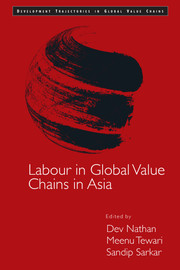Preface
Published online by Cambridge University Press: 23 July 2017
Summary
The editors and many of the authors have spent much of the last decade researching various dimensions of Global Value Chains (GVCs). This is also the decade in which GVCs have grown in importance as the manner in which global production and trade is organized today. There are many aspects of the rise of GVCs and its implications for labour that demand closer analysis and examination as we move from trade in goods to trade in tasks. This book concentrates on the two-way interaction of GVCs with labour in supplier firms in late industrializing economies. This dialectic between employers, suppliers and labour within GVCs plays out in terms of both the volume and quality of employment that GVCs generate in supplier economies; and the recursive impacts of labour on the re-formation of GVCs. Both of these relations of labour within GVCs are relatively under-researched and under-theorized. An attempt to fill these gaps at the empirical and theoretical levels provides the raison d'etre of this book.
The splintering of production implies a deeper and finer division of labour in the organization of work. As the foundations of production and technology shift in the new ‘knowledge economy’, researchers have begun to read this new division of labour as a division of tasks and indeed, a division of knowledge. Splintered tasks, and the differentiated knowledge and skills associated with them, have also to be coordinated or governed. This book is organized on the basis of the manner in which tasks are divided and governed. The case studies in the book shed light on the knowledge intensity and complexity of these tasks and of the often contested organizational arrangements that govern them. The organizational arrangements that the book focuses on lie at the intersection of global value chains and the vast array of institutions that lead firms and their suppliers interact with in places where they originate, and where they touch down. These institutions range from market mediated ties, to links with state and civic actors as well as workers’ own agency. At their most basic these varied relationships and governance systems result in what the literature calls captive, modular or relational governance structures. Each assigns differing distributions of knowledge and degrees of power to the actors involved— lead firms, suppliers, states, and workers, and lead to varied distributions of the capture of value in the GVCs.
Information
- Type
- Chapter
- Information
- Labour in Global Value Chains in Asia , pp. xiv - xvPublisher: Cambridge University PressPrint publication year: 2016
